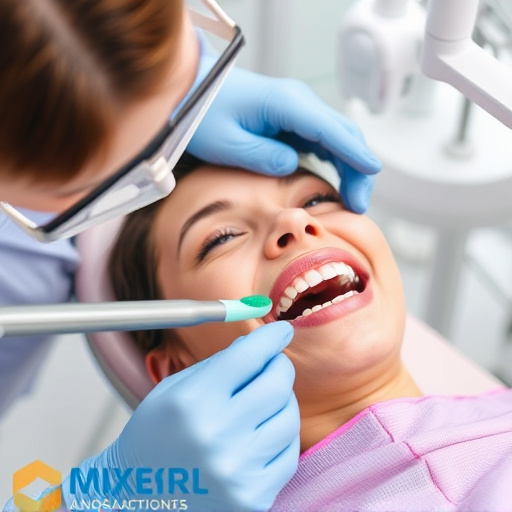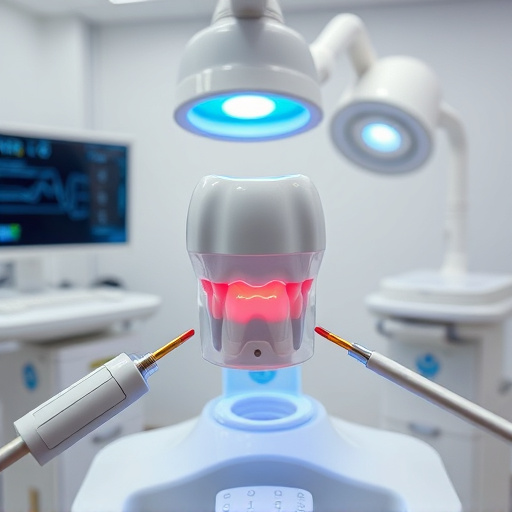Smoking severely impairs gum disease treatment due to toxic chemicals that weaken the immune system, slow healing, and increase inflammation. Nicotine reduces blood flow, exacerbates existing gum issues, and raises bacterial infection risks. Early detection through oral exams is crucial for smokers needing personalized care plans. Despite challenges, effective gum disease treatment is achievable with smoking cessation, regular cleaning, clear aligner therapy, and preventive dentistry measures.
Smoking can significantly impact the outcomes of gum disease treatment, making it a crucial consideration for anyone seeking to improve their oral health. This article delves into the effects of smoking on gum inflammation and healing processes, offering insights that can guide effective treatment strategies despite this habit. By understanding nicotine’s role and exploring proven methods to combat its negative influences, individuals can enhance their chances of successful gum disease treatment and overall oral well-being.
- Smoking's Impact on Gum Inflammation
- Nicotine and Healing Processes
- Strategies for Effective Treatment Despite Smoking
Smoking's Impact on Gum Inflammation

Smoking has a profoundly negative impact on gum inflammation, complicating the trajectory and outcome of gum disease treatment. The toxic chemicals in cigarette smoke disrupt the delicate balance of the oral ecosystem by impairing the immune system’s ability to fight off bacterial infections that contribute to gum disease. This disruption results in increased inflammation and can lead to accelerated bone loss and tissue damage.
The effects of smoking are particularly detrimental to the healing process required for effective gum disease treatment. Studies have shown that smokers have poorer outcomes after periodontal therapy, including slower healing rates and higher rates of recurrence. As such, addressing smoking habits is an essential component of comprehensive dental care, encompassing not only general oral health but also successful outcomes in managing and treating gum disease, even considering specialized treatments like dental implants or children’s dentistry.
Nicotine and Healing Processes

Nicotine, a key component in tobacco products, has detrimental effects on the body’s natural healing processes, including those involved in gum disease treatment. Research has shown that smoking impairs blood flow to the gums and jawbone, which is crucial for the success of various treatments, from scaling and root planing to more invasive procedures like tooth extractions. The reduced blood supply hampers the delivery of essential oxygen and nutrients to the affected areas, slowing down healing and increasing the risk of complications.
Moreover, nicotine’s inflammatory properties can exacerbate existing gum inflammation and make it harder for the body to fight off bacterial infections. This creates a vicious cycle where smoking both impairs healing and increases the likelihood of recurrence after treatment. In light of these findings, routine oral exams become even more critical for smokers, as early detection and intervention can significantly improve outcomes in managing gum disease. General dentistry practices play a vital role in advising and supporting patients who smoke, offering guidance on quitting and personalized care plans to address smoking’s impact on dental health.
Strategies for Effective Treatment Despite Smoking

Despite the challenges posed by smoking, effective gum disease treatment is still achievable. Quitting smoking significantly improves gum health and enhances the chances of successful treatment. Strategies such as regular teeth cleaning and using clear aligners can aid in regaining oral health.
Preventive dentistry plays a crucial role here. Regular check-ups with dental professionals, coupled with proper oral hygiene practices like flossing and using antibacterial mouth rinses, can prevent the progression of gum disease. In addition, addressing any underlying dental issues promptly can contribute to better outcomes, especially for smokers who are at a higher risk of complications.
While smoking can significantly impact the outcome of gum disease treatment, it’s not an insurmountable barrier. Understanding how nicotine affects healing processes empowers smokers to actively participate in their oral health care. By employing effective strategies, such as combining robust oral hygiene with support systems and alternative treatments, those who smoke can still achieve positive results in managing and overcoming gum disease.














